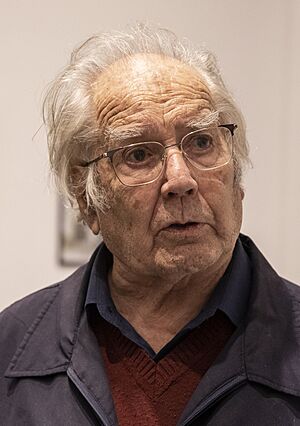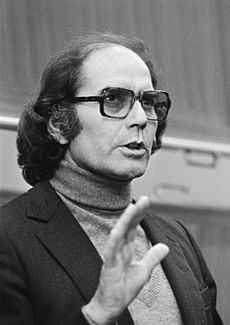Adolfo Pérez Esquivel facts for kids
Quick facts for kids
Adolfo Pérez Esquivel
|
|
|---|---|

Pérez Esquivel in 2023
|
|
| Born | 26 November 1931 Buenos Aires, Argentina
|
| Alma mater | National University of La Plata |
| Awards |
|
| Signature | |
 |
|
Adolfo Pérez Esquivel (born November 26, 1931) is an important activist, artist, and writer from Argentina. He won the Nobel Peace Prize in 1980. He received this award because he bravely stood up against Argentina's military government, which ruled from 1976 to 1983. During that time, he was arrested, treated badly, and held without a trial for 14 months. He also received other important awards, like the Pacem in Terris Award.
Contents
Early Life and Education
Adolfo Pérez Esquivel was born in Buenos Aires, Argentina, on November 26, 1931. His father was a fisherman from Spain who moved to Argentina. Adolfo's mother passed away when he was only three years old.
Even though his family was poor, he was able to study art. He went to the Manuel Belgrano School of Fine Arts and the National University of La Plata. There, he learned to be a painter and a sculptor. For 25 years, he taught art at different levels, from primary school to university.
In the 1960s, Pérez Esquivel started working with groups in Latin America that believed in peace and helping others. He left his teaching job in 1974. He became a leader for groups that wanted to help poor people through peaceful actions.
Fighting for Human Rights
In March 1976, a military government took power in Argentina. This government treated people very harshly. Adolfo Pérez Esquivel helped create and support groups that worked to protect human rights in Argentina. These groups also helped the families of people who were hurt or disappeared during this difficult time, known as the Dirty War.
He helped start an organization called Servicio Paz y Justicia (which means "Service, Peace and Justice Foundation," or SERPAJ) in 1974. This group worked to defend human rights. They told the world about the terrible things the military government was doing. SERPAJ is part of a larger international group called the International Fellowship of Reconciliation, which supported Pérez Esquivel's work from the beginning.
Pérez Esquivel faced many dangers because of his work. He was arrested by the police in Brazil in 1975. In 1976, he was put in jail in Ecuador with other religious leaders. In 1977, he was arrested in Buenos Aires by the Argentine police. He was treated badly and held in jail for 14 months without a trial. While he was in prison, he received an award called the Pope John XXIII Peace Memorial.
Nobel Peace Prize
In 1980, Adolfo Pérez Esquivel was given the Nobel Peace Prize. He was nominated by two previous Nobel Peace Prize winners, Mairead Corrigan and Betty Williams. He received the award on December 10, 1980, for his important work in defending human rights.
When he accepted the prize, he said he was doing it "in the name of the poorest and smallest of my brothers and sisters." He gave all the prize money to charity. Even after winning the Nobel Prize, he continued to support groups like the Mothers of the Plaza de Mayo, who were searching for their missing loved ones. He also supported the rights of indigenous peoples of Argentina and worked to protect the environment. He spoke out against policies that made life harder for people.
In 1999, Pérez Esquivel received another important award, the Pacem in Terris Award.
Pérez Esquivel has held many important positions. He was the president of the Honorary Council of Service, Latin American Peace and Justice Foundation. He was also a member of the International League for Human Rights and Liberation of Peoples. He wrote a book called Caminando Junto al Pueblo ("Walking Together with the People," 1995). In this book, he shared his experiences with peaceful actions in Latin America. In 1998, he became a professor at the University of Buenos Aires, teaching about peace and human rights.
Recent Activities
Adolfo Pérez Esquivel continues to be a lecturer at the University of Buenos Aires Faculty of Social Sciences. He leads a special class there called "Culture for Peace and Human Rights."
He has spoken out on many global issues. He disagreed with some international actions in the 2011 Libyan Civil War and warned against similar actions in the Syrian Civil War. After the death of Osama bin Laden, he wrote a letter to President Barack Obama. He suggested that trying bin Laden in court might have revealed important information. He also said that some events were used as reasons to start wars.
In 2013, when Jorge Bergoglio became Pope Francis, Pérez Esquivel shared his thoughts. He said that as a leader of the Jesuits, Bergoglio "had lacked the sufficient courage shown by other Bishops to support our cause for human rights during the dictatorship." However, Pérez Esquivel also clarified that the future Pope "was no accomplice and had no links with the dictatorship." He added that while some say the Pope didn't do enough to help two priests, he knew that many bishops tried to get prisoners released, but their requests were often denied by the military government.
In June 2017, he supported the government of Nicolás Maduro in Venezuela. He said that the country was facing an attempt to overthrow the government.
In January 2022, he was hospitalized after having a stroke.
Works of Art
Adolfo Pérez Esquivel is also a talented artist. His work includes exhibitions, large murals, and monuments. Some of his notable works include:
- The 15-station Latin American Via Crucis, which includes a special cloth called "A new sky and a new land." This was made in 1992 to remember 500 years since the arrival of Europeans in America.
- The Monument to Refugees, located at the headquarters of the UNHCR in Switzerland.
- The Latin American Peoples Mural in the Cathedral of Riobamba, Ecuador. This mural is dedicated to Monsignor Proaño and the indigenous peoples.
- A bronze statue honoring Mahatma Gandhi at Gandhi Square in Barcelona, Spain.
See also
 In Spanish: Adolfo Pérez Esquivel para niños
In Spanish: Adolfo Pérez Esquivel para niños
- World Social Forum
- Adolfo Perez Esquivel: Rivers of Hope
 | Laphonza Butler |
 | Daisy Bates |
 | Elizabeth Piper Ensley |


